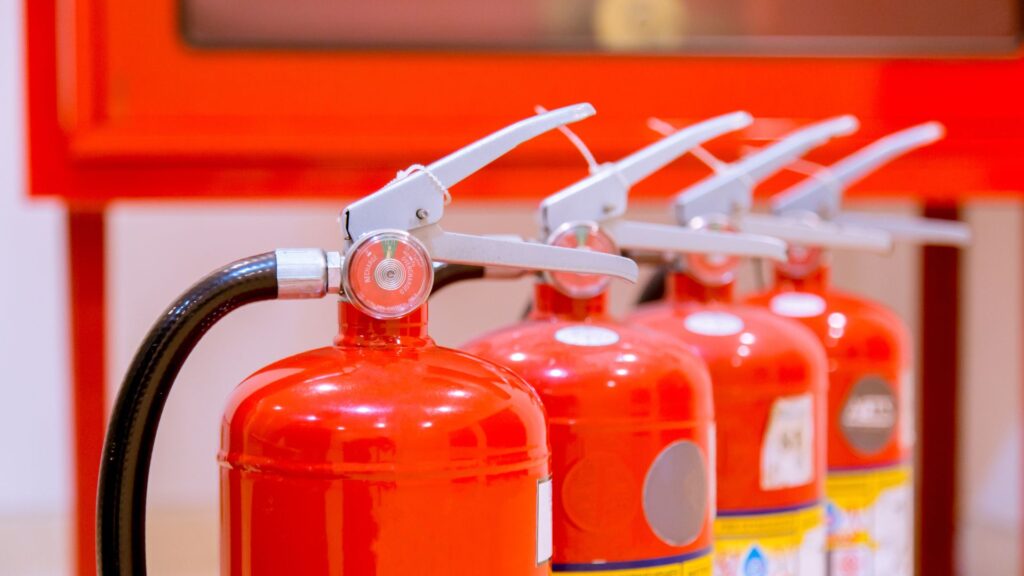Essential Safety for Landlords and Businesses in London

Table of Contents
Fire Extinguisher Servicing London: What is Fire Extinguisher Testing?
Fire extinguisher testing involves a series of checks and maintenance procedures performed on fire extinguishers to ensure they are in proper working order. This process includes inspecting, servicing, and sometimes refilling or replacing extinguishers. Regular testing is critical for the safety of buildings and their occupants, as malfunctioning fire extinguishers can lead to devastating consequences during a fire emergency.
Why is Fire Extinguisher Testing Required?
Legal Requirements
In the UK, fire safety regulations mandate that landlords and businesses maintain their fire safety equipment, including fire extinguishers. The Regulatory Reform (Fire Safety) Order 2005 specifies that all fire safety equipment must be “subject to a suitable system of maintenance and be maintained in an efficient state, in efficient working order and in good repair.”
Safety Assurance
Regular testing ensures that fire extinguishers will function correctly in an emergency. This can prevent small fires from escalating into large, uncontrollable blazes, potentially saving lives and property.
Insurance Compliance
Insurance policies often require businesses to comply with fire safety regulations. Failure to maintain fire extinguishers can lead to claims being denied if a fire occurs.
Fire Extinguisher Servicing London: Types Extinguishers and Their Uses
There are several types of fire extinguishers, each designed to handle different kinds of fires. Understanding which extinguisher to use in various situations is crucial for effective fire safety.
1. Water Extinguishers
Suitable for: Class A fires (solid combustibles like wood, paper, and textiles)
Not Suitable for: Electrical fires, flammable liquids, or flammable gases
Water extinguishers work by cooling the burning material below its ignition temperature. They are commonly found in offices, schools, and hospitals.
2. Foam Extinguishers
Suitable for: Class A and B fires (solid combustibles and flammable liquids like petrol and oils)
Not Suitable for: Electrical fires, cooking oil fires
Foam extinguishers create a barrier between the fuel and the fire, smothering the flames. They are ideal for environments where flammable liquids are present.
3. CO2 (Carbon Dioxide) Extinguishers
Suitable for: Class B and E fires (flammable liquids and electrical fires)
Not Suitable for: Solid combustibles or cooking oil fires
CO2 extinguishers work by displacing oxygen around the fire and cooling the flames. They are perfect for areas with sensitive electronic equipment, such as server rooms.
4. Dry Powder Extinguishers
Suitable for: Class A, B, C, and E fires (solid combustibles, flammable liquids, flammable gases, and electrical fires)
Not Suitable for: Cooking oil fires (Class F)
Dry powder extinguishers work by forming a barrier that smothers the flames. They are versatile but can cause visibility issues and damage delicate equipment due to the powder residue.
5. Wet Chemical Extinguishers
Suitable for: Class F fires (cooking oils and fats)
Not Suitable for: Electrical fires or flammable liquids
Wet chemical extinguishers cool the flames and create a soapy layer that prevents re-ignition. They are essential for kitchens and other areas where cooking with oils occurs.
Fire Extinguisher Servicing London: The Testing Process
Visual Inspection
Regular visual inspections can identify obvious issues like damaged hoses or missing safety pins.
Maintenance Checks
Qualified technicians perform detailed checks to ensure all components are functional. This can include checking pressure levels, testing discharge mechanisms, and verifying expiry dates.
Refilling and Recharging
If an extinguisher has been used or if it fails pressure tests, it may need to be refilled or recharged with the appropriate extinguishing agent.
Replacement
Extinguishers have a finite lifespan. If an extinguisher is deemed beyond repair or has reached the end of its service life, it must be replaced with a new one.
Learn about portable fire extinguisher maintenance
Fire Extinguisher Servicing London: Conclusion
Fire extinguisher testing is a critical component of fire safety for landlords and businesses in London. By understanding the importance of regular testing and the appropriate use of various types of extinguishers, you can ensure that your property is well-protected against fire hazards. At Budget PAT Testing, we provide comprehensive fire extinguisher testing services to help you comply with regulations and keep your premises safe. Contact us today to schedule a service appointment and ensure your fire safety equipment is in top condition.

0 Comments